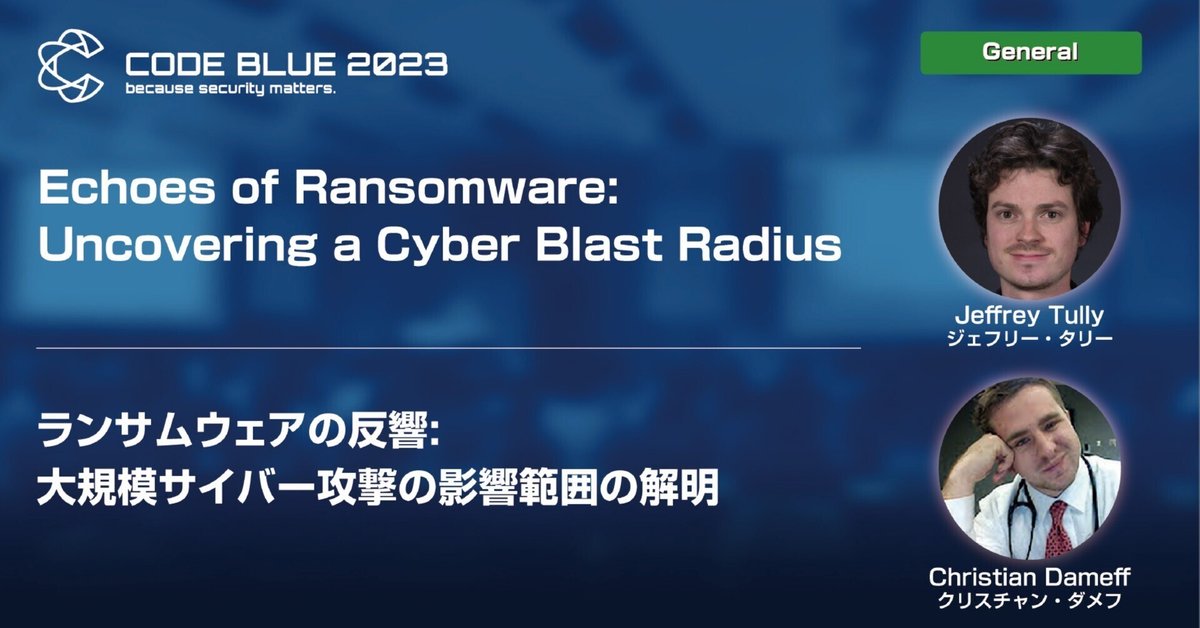
【CODE BLUE 2023】ジェフリー・タリー氏 & クリスチャン・ダメフ / Jeffrey Tully & Christian Dameff
●Abstract
ランサムウェアの反響: 大規模サイバー攻撃の影響範囲の解明[ja]
Echoes of Ransomware: Uncovering a Cyber Blast Radius [en]
今回は、「ランサムウェアの反響: 大規模サイバー攻撃の影響範囲の解明」のジェフリー・タリー氏とクリスチャン・ダメフ氏をご紹介します。テーマは、病院がランサムウェアの攻撃を受けた際の影響についてです。ジェフリー・タリー氏に回答をいただきました。
この講演の最大の特徴は、講師の2人が実務医でありセキュリティ研究者であるという点です。医療機器のハッキングなどを研究し、BlackHatやDEFCONといったセキュリティ・カンファレンスへの登壇実績もあります。
講師によれば、ランサムウェアの攻撃を受けた病院に近接する攻撃を受けなかった病院の状況も調査を行ったといいます。これは、地域全体の医療体制を考える上で非常に重要な点だと言えるでしょう。
●Bio
ジェフリー・タリー クリスチャン・ダメフ[ja]
Jeffrey Tully Christian Dameff [en]
ーーー
●Interview
[Ja]インタビュー
Q1. 今回、カンファレンスで発表する研究を始めたきっかけを教えてください。
A1. クリスチャンと私は医学校で出会いました。そして、それぞれがコンピューターに対して強い関心を持っていることがわかりました。クリスチャンは私にハッカー文化を教えてくれました。そして、われわれが医療トレーニングを進める中で気づいたのは、病院で患者を治療するために使われている多くの技術がハードウェアやソフトウェアに頼っており、それらは他の産業と同様にセキュリティの脆弱性があるということでした。
われわれは、医療サイバーセキュリティという新たな分野を探求しはじめ、セキュリティの脆弱性が、患者治療とその結果に対して、どのように影響を影響するかを学びたいと考えました。その過程で、われわれは素晴らしい人々と出会いました。医療機器のセキュリティを研究するハッカーや、患者治療に使用される技術に対して適切なサイバーセキュリティ保護を負う規制当局や政策立案者などです。
ここ数年、ランサムウェアは病院やクリニックにとってますます脅威となっており、われわれは、この問題を研究対象に含めてきました。われわれは、医療ランサムウェア攻撃に関するデータを見つけ、より良い対応計画を立てるのに役立つ情報の収集に取り組んでおり、CODE BLUEではこのトピックを共有する予定です。
Q2. 研究の過程でどのような点で苦労しましたか?
A2. 医療機関におけるランサムウェア攻撃のデータを入手するのは、いくつかの理由から非常に難しいことです。
まず第一に、病院は評判に悪影響を及ぼす可能性がある情報を共有することに非常に消極的ですし、政府の罰金や患者からの訴訟につながる可能性もあります。
第二に、たとえ病院が研究者にデータを提供する用意があるとしても、患者の治療データを収集するために臨床現場で使用される多くのツールは、ランサムウェア攻撃中に機能しない可能性が高い点です。
最後に、比較的まれな事象(ランサムウェア攻撃)が、他の比較的まれな事象(心臓発作や脳卒中などの重篤な病状)に与える影響を調査するには、かなりの量のデータが必要な点が挙げられます。
Q3. CODEBLUEの参加者、参加を検討している人に向けてメッセージをお願いします。
A3.CODE BLUEの参加者の皆様が、新しい分野である医療サイバーセキュリティに興味があるのであれば、この講演に参加していただきたいと思います。そして、臨床技術がますます接続される世界において、患者を可能な限り安全かつセキュアに保つための取り組みについてご覧いただきたいとも思います。
われわれは、この使命において誰もが役割を果たし、貢献の方法を見つけることができると考えています。私たちの視点・経歴・研究を共有することで、セキュリティコミュニティの方々にこの重要な使命に参加していただけるよう、皆さんを触発したいと考えています。
ーーーー
[en]Interview
Q1. How did you initiate your journey into the topic that you are presenting?
A1. Christian and I met in medical school, where we both found we shared deep interest in computers. Christian introduced me to the hacker culture, and as we journeyed further into medical training we realized that many of the technologies we used to care for our patients in the hospital relied on the same kinds of software and hardware we knew from other industries to have security vulnerabilities.
We began to explore a new field of healthcare cybersecurity and wanted to learn about how security vulnerabilities might affect patient care and outcomes. Along the way we have met many wonderful people including hackers who perform security research on medical devices and regulators and policymakers who are in charge of developing adequate cybersecurity protections for technologies used in patient care.
Over the last several years, ransomware has become an increasing threat to hospitals and clinics and we have included this problem in our research focus. We have worked to find data on healthcare ransomware attacks that can be used to make better response plans and that is the topic which we will be sharing at CODE BLUE.
Q2. What were some challenges you faced during this research?
A2. It is very challenging to obtain data on healthcare ransomware attacks for a number of reasons.
First, hospitals are very reluctant to share information which may affect their reputation or lead to government fines or lawsuits from patients.
Second, even if hospitals were open to providing data to researchers, many of the tools that we use in the clinical world to collect patient care data rely on software and endpoints that are likely not working during a ransomware attack.
Last, a significant amount of data is needed to be able to draw conclusions about the impact of relatively rare events (ransomware attacks) on other relatively rare events (serious medical conditions like heart attack or stroke).
Q3. What message would you like to convey to those considering attending this talk?
A3. We humbly invite CODE BLUE attendees to join us for this talk if they are interested in getting a glimpse into the newer field of healthcare cybersecurity and to learn about ways in which we are working to keep patients as safe and secure as possible in a world of increasingly connected clinical technology.
We feel that everyone can have a role to play and a way to contribute in this mission and by sharing our perspective, background, and research, we hope to inspire people in the security community to join us in this important mission.
